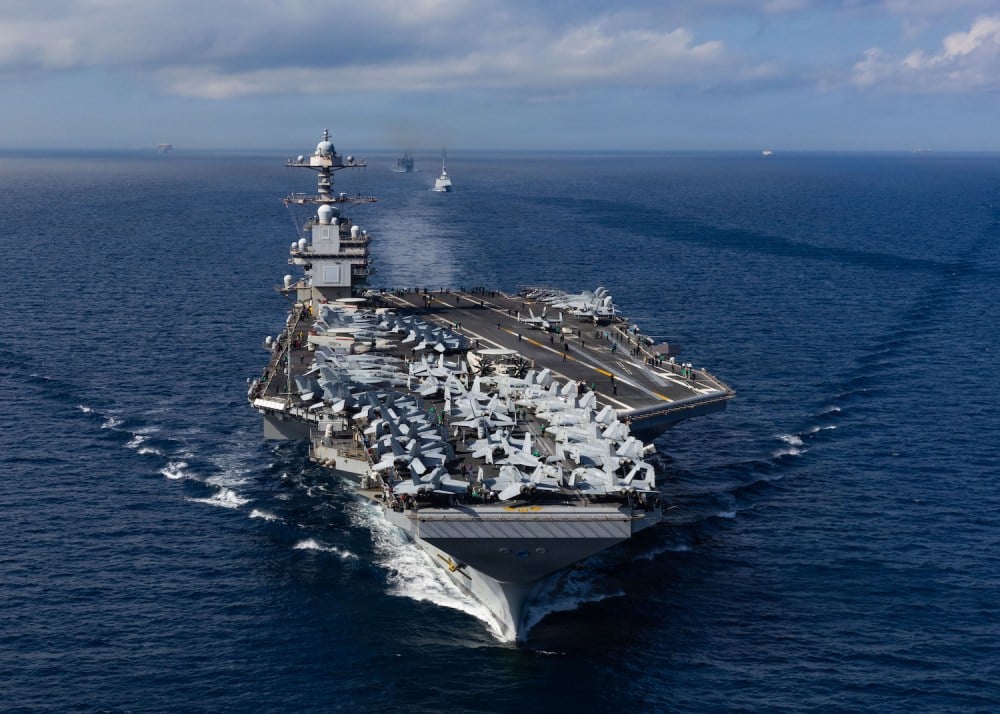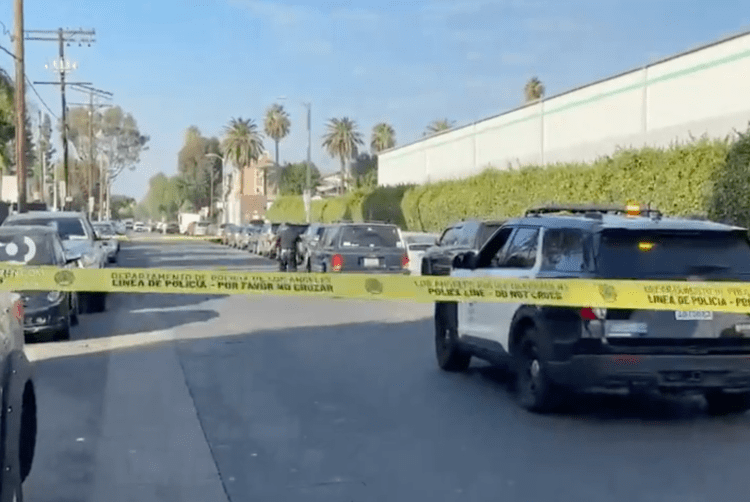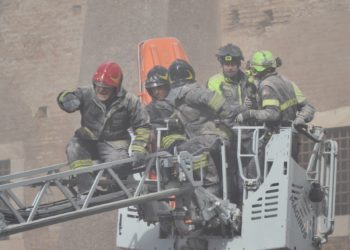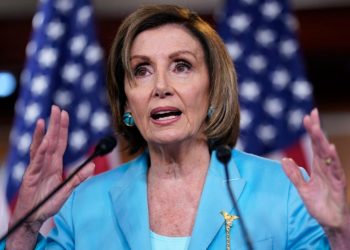With 10 naval vessels and 10,000 troops already deployed to the Caribbean—the largest military buildup there since the 1962 Cuban missile crisis—and a carrier strike group led by the USS Gerald R. Ford taking up position, some sort of military attack on Venezuela appears imminent. U.S. President Donald Trump’s rationale for this aggressive military action is that Venezuela is a hub of drug trafficking and that supplying drugs to U.S. consumers is the equivalent of an armed attack on the United States, justifying a military response.
But the real aim is to overthrow Venezuelan President Nicolás Maduro’s government and then, by cutting off the flow of Venezuelan oil to Cuba, fulfill the Republican right’s decades-long dream of collapsing the Cuban government. It’s a strategy that John Bolton, national security advisor in the first Trump administration, tried without success in 2019, but Secretary of State and National Security Advisor Marco Rubio now intends to try again. It’s unlikely to work this time, either, though the cost of a military conflict will be higher for U.S. regional interests and much higher for Venezuelans.
U.S. armed forces have already obliterated more than a dozen alleged drug trafficking boats in the Caribbean and the Pacific, killing more than 60 people—so far. Trump has designated traffickers as foreign terrorists and declared war on them.
“We are going to kill people that are bringing drugs into our country, OK? We are going to kill them,” Trump told reporters in late October. “The land is going to be next,” he added, presumably referring to Venezuelan national territory. The Miami Herald reports that Venezuelan military installations will be the targets.
Trump has also authorized covert CIA operations inside Venezuela and named Maduro as the alleged leader of the Cartel de los Soles, a Venezuelan criminal organization that Trump designated a foreign terrorist organization in February. The Justice Department has offered a $50 million reward to anyone who provides information leading to Maduro’s arrest. Among the U.S. military units now deployed off the coast of Venezuela is the 160th Special Operations Aviation Regiment—the “Night Stalkers”—which supported the special forces operation that killed Osama bin Laden.
Although Venezuela is Cuba’s closest ally in Latin America and a vital source of low-cost oil, Havana has no way of countering a U.S. attack—any more than it was able to defend Grenada from a U.S. invasion in 1983. To try would invite a U.S. attack on Cuba itself. Cuban diplomats have said as much publicly and repeated it to Venezuelan officials privately.
Since the rise of the late Gen. Hugo Chávez and his Chavista movement more than 25 years ago, Caracas has been Cuba’s ally and patron, albeit with diminishing returns as Chavez’s authoritarian successor, Maduro, has presided over the self-destruction of his nation’s economy. The alliance is one of the reasons that a U.S. attack on Venezuela has potentially serious implications for Cuba. There are still thousands of Cuban medical personnel serving there, along with an unknown number of military and intelligence advisors. If the United States strikes Venezuelan government installations, especially military ones, Cuban lives would be at risk. Even so, there’s little that Cuba could do other than protest and ramp up its own military preparedness as it has in the past during moments of heightened tension.
If Washington manages to unseat Maduro, then his successor would very likely cut off oil shipments to Havana, striking another blow to an already reeling Cuban economy. U.S. success in Venezuela could also threaten Cuba’s national security if the Trump administration, intoxicated with the win, decided to expand its aggressive military interventionism.
But Havana is no longer as dependent on Venezuela as it was a decade ago.
The alliance between Havana and Caracas was formed in 1998, when Chávez was first elected as Venezuela’s president, advocating “21st century socialism.” Chávez and Fidel Castro developed a strong personal bond even before the election. Chávez saw Castro as his mentor; Castro saw Chávez as his protégé.
In 2000 and 2003, the two countries signed cooperation agreements for Venezuela to provide Cuba with petroleum at subsidized prices in exchange for the services of Cuban medical personnel deployed to Chávez’s working-class constituencies. At the peak of this trade, from 2008 to 2015, Cuba received more than 100,000 barrels of oil per day (bpd) while nearly 30,000 Cuban doctors and technicians served in Venezuela
But beginning in 2016, Venezuelan oil production began to decline due to mismanagement and poor maintenance. By the middle of 2018, it had fallen by half. Over roughly the same few years, the global price of oil also fell by about half, drastically cutting Venezuela’s revenue. Oil shipments to Cuba declined as Venezuela sold more production for its own benefit. By 2024, shipments had fallen to 32,000 bpd and have been even lower this year.
The shrinking supply of Venezuelan oil has exacerbated its perennial shortage of foreign exchange currency. Power blackouts have become routine and domestic production is suffering from lack of fuel. But there’s a silver lining for Cuba in these dark clouds: Havana is less dependent on Venezuelan oil now than it was a decade ago.
In 2014, Cuban economist Pedro Vidal estimated that the sudden, complete loss of Venezuelan oil would knock 7.7 percent off of Cuba’s GDP. But since Venezuela’s largesse has already fallen by almost three-quarters and the price of oil is now roughly half of what it was then, Cuba has already absorbed most of the shock that Vidal predicted. Moreover, as Cuba’s energy crisis has worsened, Mexico and Russia have been willing to increase their oil shipments at concessionary prices to fill at least part of the deficit.
The Trump administration has made it clear that its goal is to overthrow the Maduro government. What remains unclear is how. Will the CIA try to turn the armed forces against him to foment a coup? Will the Night Stalkers drop SEAL Team Six into Caracas in the dead of night to snatch Maduro from Miraflores Palace, rendition him to the United States, and put him on trial for narcotics trafficking? Will the U.S. forces amassing in the Caribbean launch airstrikes to pressure the military to overthrow him for their own survival? Or will it be enough to make the Venezuelan armed forces an offer they can’t refuse: remove Maduro or face destruction?
The least likely option is a full-scale invasion and occupation of Venezuela, given Trump’s pledge to stay out of foreign wars and abstain from nation-building. Moreover, the Venezuelan military has taken Cuba’s advice on how to resist an invasion—not by trying to defend strategic targets but by melting into the population to wage an asymmetric “war of all the people.”
Add to that several thousand veteran guerrillas of the Colombian National Liberation Army (Ejército de Liberación Nacional—ELN) operating in Venezuela, and pacifying Caracas could prove far more complicated than anticipated.
Rubio has his eye on a bigger prize. During the first Trump administration, Bolton imagined that overthrowing Maduro would lead inexorably to the collapse the other two governments in the socialist “troika of tyranny,” Cuba and Nicaragua. Bolton, it turned out, underestimated Maduro’s staying power and the loyalty of the Venezuelan armed forces.
Yet his reverse domino theory survives. U.S. Sen. Rick Scott, who originally introduced his former Senate colleague Rubio to Trump, recently told 60 Minutes that if the United States could remove Maduro and cut off the flow of oil to Havana, “It’ll be the end of Cuba.”
Orchestrating the “end of Cuba” has been Rubio’s ultimate foreign-policy goal since he was elected senator from Florida in 2010. In the Senate, he became the leading hawk on Cuba policy and led the Republican opposition to then-President Barack Obama’s 2014 effort to normalize U.S.-Cuban relations.
Trump himself has shown no real interest in Cuba since his pre-presidential plans to open a Trump hotel there fell flat. Indeed, during his first term, he told White House aides, “Make Rubio happy,” so they let Rubio and Rep. Mario Díaz-Balart craft Trump’s Cuba policy. Now, doubling as both secretary of state and national security adviser, Rubio’s hands are on the levers of power to advance his goal of rolling back the Cuban Revolution.
“Rubio’s legacy project is regime change in Cuba,” said a Senate staffer who is monitoring the military buildup in the Caribbean, speaking to the authors privately. “This is Rubio’s chance to do what he has always wanted to do.”
But regime change is easier said than done. U.S. officials have been underestimating the staying power of the Cuban government ever since 1959. A little more pressure, so the argument goes, one more twist of the screw, and the “Castro regime” will crumble. Next year will be the 10th anniversary of Castro’s death, and the regime he built is still standing.
Despite the desperate state of the Cuban economy and widespread popular discontent, there is no organized opposition of any consequence. Activists who have tried to build one are either in exile or in jail. Cuban State Security has proven adept at containing U.S. “democracy promotion” programs aimed at fomenting opposition, as can be attested by Alan Gross, the American subcontractor who spent five years in a Cuban prison for his part in one of them.
The idea that cutting off Venezuelan oil will be the straw that breaks the back of the Cuban government is a pipe dream. To be sure, the further loss of Venezuelan oil would be a serious blow to the Cuban economy, and it would deepen people’s misery. But misery doesn’t automatically translate into rebellion. Misery can just as easily produce a deeper siege mentality among elites, or political disengagement by people preoccupied with simple survival. In the worst case, it can precipitate a failed state.
“Within the Western Hemisphere,” wrote Ben Rhodes, a former deputy national security advisor under Obama, “Mr. Trump is beginning to act like Mr. Netanyahu in the Middle East or Mr. Putin within the former Soviet Union — a right-wing leader claiming a sphere of influence where he is free to act as he chooses.”
Trump’s brutish return to the use of “gunboat diplomacy” to assert U.S. dominion will prove costly for real U.S. interests in the Latin American region, reinforcing the historic image of the United States as the hegemonic bully.
U.S. strikes on boats off the Venezuelan and Colombian coasts have already been condemned as violations of international law by the United Nations high commissioner for human rights and three other U.N. officials as well as Amnesty International and Human Rights Watch. Similar criticism has come from members of Congress, including a few Republicans, a raft of international lawyers, and even from some voices inside the Defense Department. The White House has dismissed all criticism out of hand.
Not so easily dismissed are the protests by Presidents Claudia Sheinbaum of Mexico and Gustavo Petro of Colombia, because Washington needs their cooperation to reduce the production and transport of drugs destined for the United States. Those are largely the countries—not Venezuela—that the drugs come from. Most Latin American leaders have remained silent so far, but more will speak out if the United States attacks Venezuela, not because they have any sympathy for Maduro—they don’t—but because they know that next time, it could be them.
The more profound consequence will be an acceleration of the gradual shift in South America away from the United States and toward China. Trump’s tariffs have already shown that the United States is no longer a reliable economic partner. If it is now becoming a military threat as well, then it’s time to look for partners—and security alliances—elsewhere.
“If you break it, you own it,” former Secretary of State Colin Powell famously warned President George W. Bush as the United States prepared to invade Iraq. Trump, take heed. Sustained military conflict with Venezuela will further destabilize the region, spurring another wave of migration, shocking global oil markets, and creating more ungoverned spaces in Venezuela for traffickers to occupy. How many more Venezuelan lives stand to be lost? Hundreds? Thousands? And for what?
Airstrikes on Venezuela will not halt the flow of drugs into the United States. Where there are hefty profits to be made, demand always calls forth supply. Military action and the threat of escalation may lead to Maduro’s departure, but the Venezuelan armed forces profit from the status quo. If they remain intact, then not much will change in Caracas short of U.S. military occupation. Nor is a cutoff of Venezuelan oil likely to unseat the Cuban government, which has survived far worse economic blows.
The watchword of Trump’s foreign policy is to speak loudly and carry a big stick. No one can stop him from bashing Venezuela with it, and once he does, he will undoubtedly claim victory, no matter how meager the results. But the wreckage left behind, to U.S. regional interests and to Venezuela, will not soon be repaired, nor soon forgotten.
The post With Military Buildup Against Venezuela, the U.S. Eyes Cuba as Well appeared first on Foreign Policy.




